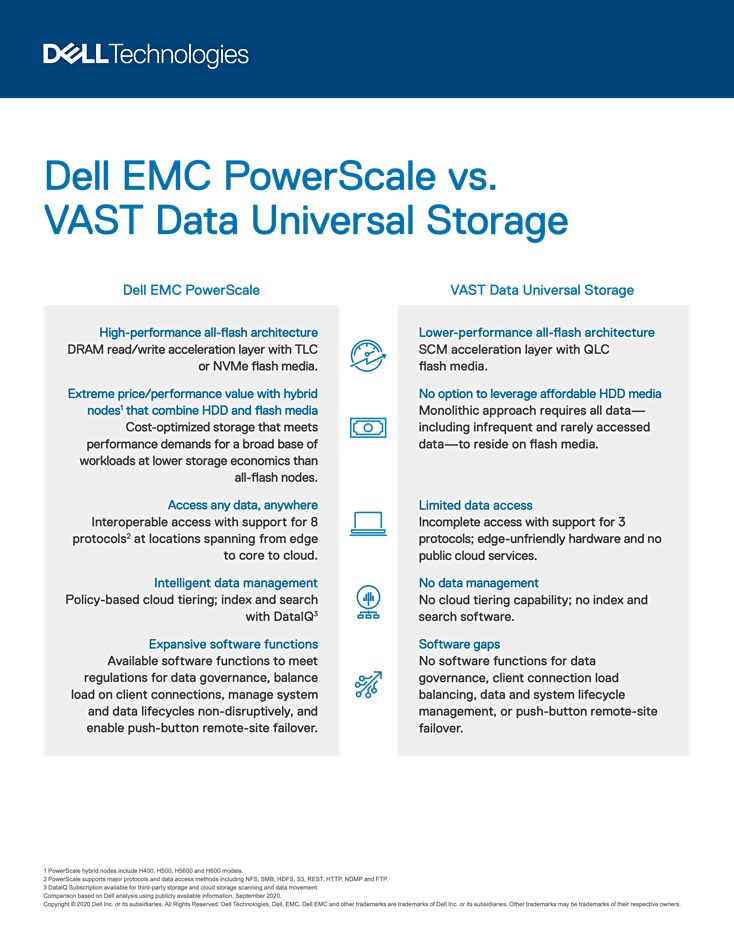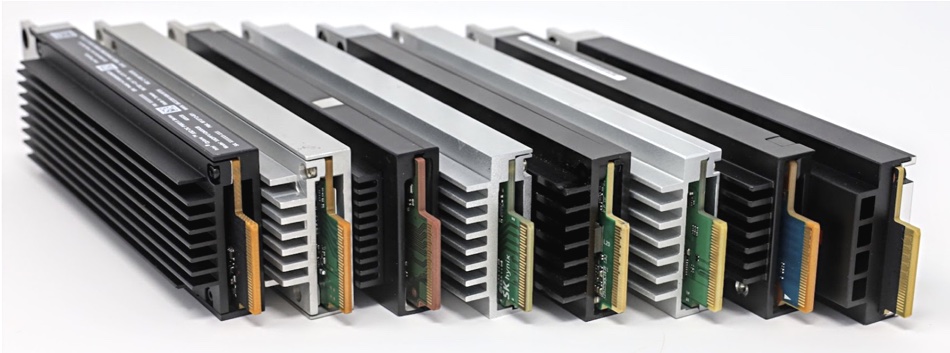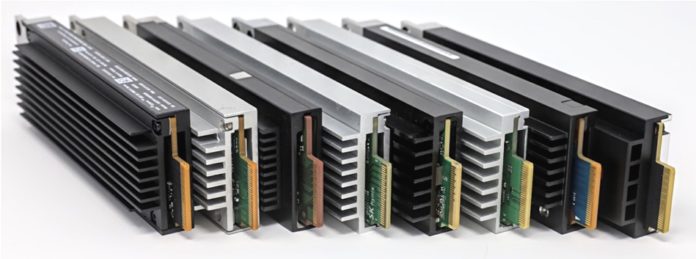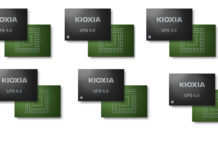Some big names in the storage digest this week, with Dell (sort of) formally recognising VAST by producing what’s known as a sales knock-off card, IBM adding better tiering to its z/OS mainframe software, and a Microsoft staffer penning a truly great blog about the E1.S SSD format set to replace M.2 gumstick drives.
Dell has a VAST spat
Much to its delight, newcomer VAST Data discovered Dell had produced an aide-memoire for its sales people extolling all-flash, hybrid and tiered PowerScale advantages over the VAST Data all-flash array. Recognition at last!

Quick as a (QLC) flash, VAST co-founder and CMO Jeff Denworth penned a blog about legacy storage vendors having to sell product on legacy features while newcomers, like VAST, could get rid of unwanted legacy baggage.
He was pleased, writing: “As we were the only privately-held company to have received such an honour, the fact that they’re now publishing competitive positioning documents is a validation of our ascent. The whole situation is also a little awkward, given that Dell is also a long-time investor in VAST dating all the way back to our Series A.” Ouch.
Denworth revealed that VAST is growing fast — revenues grew 4x year-over-year. And he’s also tweeted VAST has received $20 million in software orders from just two companies this week.
IBM’s mainframe OS storage news
Version 2.5 of z/OS, the operating system for IBM’s Z-series mainframes, has been announced with, amongst other new features, enhanced storage capabilities.
Pervasive encryption is available for sequential basic format and large format SMS-managed data sets. SMS stands for Storage Management Subsystem — an automated data set attribute facility. It enables data to be encrypted without application changes.
The new release provides additional capabilities for Transparent Cloud Tiering (TCL) and an Object Access Method (OAM) cloud tier to offload data to affordable cloud storage for archiving and protection.
An IBM document says: “DFSMSdss full-volume dump support for transparent cloud tiering is intended to enable all data movement to be performed by a DS8000 directly to a TS7700 configured as an object store, or directly to cloud object storage. This capability is planned to enable the creation of a DFSMSdss full-volume dump from a FlashCopy or safeguarded copy recovery volume to cloud object storage or a TS7700 DS8000 object store, with no MIPS consumed for the actual data movement. Off-premises, cloud object storage copies can enable air-gapped point-in-time copies of an entire enterprise, enabling a high level of resiliency from a malicious data destruction event and assisting with regulatory compliance.”
The document also touts “Compression support for transparent cloud tiering with TS7700 as an object store. Data is planned to be able to be compressed within an IBM DS8900F prior to being transferred over TCPIP to a TS7700 configured as an object store. The intent is to enable clients to store more data in the same physical space within the TS7700, reducing cost per GB, reducing bandwidth requirements with no impact on IOPS performance, and maximising system resources by avoiding compression of data already compressed or encrypted by IBM Z.”
Microsoft’s paean to the short ruler SSD
Jason Adrian, a Principal Hardware Architect for Azure Storage Hardware, has written a highly informative blog on LinkedIn about the E1.S — S for ‘short’ — ruler format for SSDs.
E1.S is an SNIA-approved variant of the EDSFF or ruler form factor and measures 111.49mm x 31.5mm. It should replace the current M.2 gumstick format with its 110.0mm long by 30.5mm wide dimensions. There is no scope in the M.2 format for heat sinks on the drive as well as there being limited real-estate.
The longer and wider E1.S design enables more flash chips to be mounted on the card, and allows for heat sinks so that the cards can run hotter. There are three cased E1.S variant designs, with 9.5mm, 15mm and 25mm thickness allowing for differentially-sized heatsinks.
In Adrian’s view: “The 15mm variant arguably is the best compromise on density and performance. This form factor enables up to 24 front-loaded SSDs in a traditional 1U server. This is going to give you an IOPS density that simply can’t be matched leveraging [the] U.2 form factor. “

Adrian writes that the four main plus points for E1.S drives are the 8TB or greater capacity, high performance with more than 10GB/sec and hundreds of thousands of IOPS likely, front-serviceability, and the integrated thermal management.
He reveals that hyperscalers Microsoft and Facebook are the top consumers of E1.S drives at present, but anticipates wider enterprise adoption as E1.S-equipped servers become available. Adrian cites Intel, NGD, Samsung, SK hynix, Micron, Fadu, Kioxia and Western Digital as all producing E1.S NAND drives, with Intel having an Optane version as well.
Enterprise customers should appreciate this point made by Adrian: “Many of today’s 1U servers can fit 10x U.2 SSDs at best. With E1.S 15mm, you can run 24 SSDs with a substantial increase in performance. That offers unprecedented IOPS density in a rack.”
Read the blog — it is the single best ruler format SSD article we have seen.
Shorts
Cyber-protector Acronis announced a new Advanced File Sync and Share protection pack for its service provider solution, Acronis Cyber Protect Cloud. It builds on the file-sharing capabilities included in Acronis Cyber Protect Cloud, layering additional data security capabilities such as blockchain-based data notarisation and electronic signatures, so service providers can strengthen their workplace collaboration services.
Akash Network, which supplies an open-source decentralised cloud, is partnering decentralised storage supplier Filebase to provide multi-cloud, decentralised web (dWeb) storage options for developers and enterprises. The two say that, by offering open-source dWeb compute and petabyte-scale object storage, they can help to reduce cloud costs by up to 85 per cent, compared to traditional cloud services.
ATTO Technology announced its Xtend SAN iSCSI Initiator now supports the Apple M1 system-on-a-chip, and claims it’s the only way Apple M1 users can connect to iSCSI storage.
SaaS-based data protector Cobalt Iron has been awarded a patent for for automated network traffic shaping for data protection operations — US Patent 11063907 — in its Compass product. The technology enables dynamic adjustments to networks and storage networks in response to cyber threats and other high-security alert conditions. It uses analytics and user-defined policies to shape network and storage throughput levels dynamically to restrict security exposures and to optimise available resources during times of possible security exposures.
Data analytics-as-a-Service supplier GoodData has agreed a $45 million credit facility with J.P. Morgan. GoodData will use this financing to grow its global sales and engineering teams and continue to develop its enterprise-focussed analytics software such as the GoodData.CN cloud-native analytics product. GoodData has received a total of $101 million in VC funding with the last (E) round in 2014.
AI model and machine learning company EZOPS now supports cloud data warehouser Snowflake. Snowflake customers can leverage EZOPS AI models to analyse patterns of streamed data, which can be validated for anomalies prior to storage. If anomalies are identified, they can be escalated within the EZOPS Workflow module for processing and triaging.
Fortanix, a multi-cloud data security company, has made its DataSecurity Manager (DSM) available as a cloud-delivered service. DSM SaaS provides availability and disaster tolerance using Equinix global network and infrastructure. Fortanix also announced an integration with ServiceNow, and also with Snowflake. This protects data in the cloud via Tokenization as a Service. It claims this is an easy-to-implement SaaS solution at a lower price than competitors.
Integrated Media Technologies SoDA is now available on the AWS Marketplace. It is intended for working with unstructured data environments, and provides predictive cost and data transfer metrics for optimising on-premises and cloud storage. SoDA is also included in the reference architectures, including Media Supply Chain, Media2Cloud, and Media Intelligence, enabling rich AWS media pipelines.

Next Pathway, an automated cloud migration supplier, released a survey showing organisations are moving to the cloud in big numbers to drive competitive strategies and provide richer customer experiences — a shift from earlier adopters that looked to the cloud primarily for operational efficiencies. Download a copy here.
SMART Modular Technologies has introduced long-endurance DDR5 modules that can withstand industrial-grade temperatures. They include unbuffered and registered DIMMs in 16GB, 32GB and 64GB densities, and unbuffered and ECC SODIMMs in 8GB, 16GB, and 32GB densities.
The TigerGraph Cloud, a distributed and scalable graph database-as-a-service offering, is now available on the Google Cloud Marketplace.
The TRENDFOCUS research house said a preliminary look at the second 2021 quarter’s disk drive shipments indicated record unit and capacity shipments in the active nearline sector. There were 19 million units and 240 EB shipped, exceeding the first quarter’s 17.19 million units and almost 193 EB shipped. Big buyers were hyperscalers and OEMs, with Chia demand helping as well.








